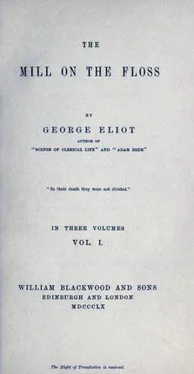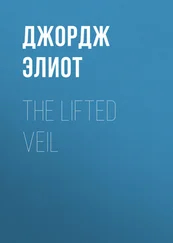"Ay, ay, that's all very well," said Mr. Deane; "but it doesn't alter what I was going to say. Your Latin and rigmarole may soon dry off you, but you'll be but a bare stick after that. Besides, it's whitened your hands and taken the rough work out of you. And what do you know? Why, you know nothing about book-keeping, to begin with, and not so much of reckoning as a common shopman. You'll have to begin at a low round of the ladder, let me tell you, if you mean to get on in life. It's no use forgetting the education your father's been paying for, if you don't give yourself a new un."
Tom bit his lips hard; he felt as if the tears were rising, and he would rather die than let them.
"You want me to help you to a situation," Mr. Deane went on; "well, I've no fault to find with that. I'm willing to do something for you. But you youngsters nowadays think you're to begin with living well and working easy; you've no notion of running afoot before you get horseback. Now, you must remember what you are, — you're a lad of sixteen, trained to nothing particular. There's heaps of your sort, like so many pebbles, made to fit in nowhere. Well, you might be apprenticed to some business, — a chemist's and druggist's perhaps; your Latin might come in a bit there—"
Tom was going to speak, but Mr. Deane put up his hand and said:
"Stop! hear what I've got to say. You don't want to be a 'prentice, — I know, I know, — you want to make more haste, and you don't want to stand behind a counter. But if you're a copying-clerk, you'll have to stand behind a desk, and stare at your ink and paper all day; there isn't much out-look there, and you won't be much wiser at the end of the year than at the beginning. The world isn't made of pen, ink, and paper, and if you're to get on in the world, young man, you must know what the world's made of. Now the best chance for you 'ud be to have a place on a wharf, or in a warehouse, where you'd learn the smell of things, but you wouldn't like that, I'll be bound; you'd have to stand cold and wet, and be shouldered about by rough fellows. You're too fine a gentleman for that."
Mr. Deane paused and looked hard at Tom, who certainly felt some inward struggle before he could reply.
"I would rather do what will be best for me in the end, sir; I would put up with what was disagreeable."
"That's well, if you can carry it out. But you must remember it isn't only laying hold of a rope, you must go on pulling. It's the mistake you lads make that have got nothing either in your brains or your pocket, to think you've got a better start in the world if you stick yourselves in a place where you can keep your coats clean, and have the shopwenches take you for fine gentlemen. That wasn't the way I started, young man; when I was sixteen, my jacket smelt of tar, and I wasn't afraid of handling cheeses. That's the reason I can wear good broadcloth now, and have my legs under the same table with the heads of the best firms in St. Ogg's."
Uncle Deane tapped his box, and seemed to expand a little under his waistcoat and gold chain, as he squared his shoulders in the chair.
"Is there any place at liberty that you know of now, uncle, that I should do for? I should like to set to work at once," said Tom, with a slight tremor in his voice.
"Stop a bit, stop a bit; we mustn't be in too great a hurry. You must bear in mind, if I put you in a place you're a bit young for, because you happen to be my nephew, I shall be responsible for you. And there's no better reason, you know, than your being my nephew; because it remains to be seen whether you're good for anything."
"I hope I shall never do you any discredit, uncle," said Tom, hurt, as all boys are at the statement of the unpleasant truth that people feel no ground for trusting them. "I care about my own credit too much for that."
"Well done, Tom, well done! That's the right spirit, and I never refuse to help anybody if they've a mind to do themselves justice. There's a young man of two-and-twenty I've got my eye on now. I shall do what I can for that young man; he's got some pith in him. But then, you see, he's made good use of his time, — a first-rate calculator, — can tell you the cubic contents of anything in no time, and put me up the other day to a new market for Swedish bark; he's uncommonly knowing in manufactures, that young fellow."
"I'd better set about learning book-keeping, hadn't I, uncle?" said Tom, anxious to prove his readiness to exert himself.
"Yes, yes, you can't do amiss there. But — Ah, Spence, you're back again. Well Tom, there's nothing more to be said just now, I think, and I must go to business again. Good-by. Remember me to your mother."
Mr. Deane put out his hand, with an air of friendly dismissal, and Tom had not courage to ask another question, especially in the presence of Mr. Spence. So he went out again into the cold damp air. He had to call at his uncle Glegg's about the money in the Savings Bank, and by the time he set out again the mist had thickened, and he could not see very far before him; but going along River Street again, he was startled, when he was within two yards of the projecting side of a shop-window, by the words "Dorlcote Mill" in large letters on a hand-bill, placed as if on purpose to stare at him. It was the catalogue of the sale to take place the next week; it was a reason for hurrying faster out of the town.
Poor Tom formed no visions of the distant future as he made his way homeward; he only felt that the present was very hard. It seemed a wrong toward him that his uncle Deane had no confidence in him, — did not see at once that he should acquit himself well, which Tom himself was as certain of as of the daylight. Apparently he, Tom Tulliver, was likely to be held of small account in the world; and for the first time he felt a sinking of heart under the sense that he really was very ignorant, and could do very little. Who was that enviable young man that could tell the cubic contents of things in no time, and make suggestions about Swedish bark! Tom had been used to be so entirely satisfied with himself, in spite of his breaking down in a demonstration, and construing nunc illas promite vires as "now promise those men"; but now he suddenly felt at a disadvantage, because he knew less than some one else knew. There must be a world of things connected with that Swedish bark, which, if he only knew them, might have helped him to get on. It would have been much easier to make a figure with a spirited horse and a new saddle.
Two hours ago, as Tom was walking to St. Ogg's, he saw the distant future before him as he might have seen a tempting stretch of smooth sandy beach beyond a belt of flinty shingles; he was on the grassy bank then, and thought the shingles might soon be passed. But now his feet were on the sharp stones; the belt of shingles had widened, and the stretch of sand had dwindled into narrowness.
"What did my Uncle Deane say, Tom?" said Maggie, putting her arm through Tom's as he was warming himself rather drearily by the kitchen fire. "Did he say he would give you a situation?"
"No, he didn't say that. He didn't quite promise me anything; he seemed to think I couldn't have a very good situation. I'm too young."
"But didn't he speak kindly, Tom?"
"Kindly? Pooh! what's the use of talking about that? I wouldn't care about his speaking kindly, if I could get a situation. But it's such a nuisance and bother; I've been at school all this while learning Latin and things, — not a bit of good to me, — and now my uncle says I must set about learning book-keeping and calculation, and those things. He seems to make out I'm good for nothing."
Tom's mouth twitched with a bitter expression as he looked at the fire.
"Oh, what a pity we haven't got Dominie Sampson!" said Maggie, who couldn't help mingling some gayety with their sadness. "If he had taught me book-keeping by double entry and after the Italian method, as he did Lucy Bertram, I could teach you, Tom."
Читать дальше












